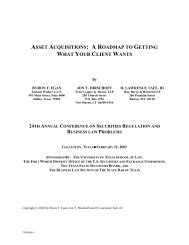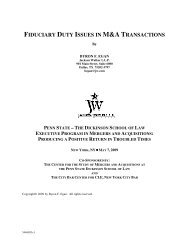Early Termination and Liquidation Provisions in Energy Trading and ...
Early Termination and Liquidation Provisions in Energy Trading and ...
Early Termination and Liquidation Provisions in Energy Trading and ...
Create successful ePaper yourself
Turn your PDF publications into a flip-book with our unique Google optimized e-Paper software.
setoff amounts due under such transactions <strong>and</strong>, <strong>in</strong> some cases, across master agreements <strong>and</strong> across affiliates;<strong>and</strong> (iv) the right to suspend payment <strong>and</strong>/or performance obligations under the master agreement. 9 Theexercise of a party’s rights under term<strong>in</strong>ation <strong>and</strong> liquidation provisions causes the cessation of, at am<strong>in</strong>imum, the term<strong>in</strong>ated <strong>and</strong> liquidated transaction(s), <strong>and</strong> usually the entire master agreement <strong>and</strong> alltransactions thereunder.II.Summary of <strong>Early</strong> <strong>Term<strong>in</strong>ation</strong> <strong>and</strong> <strong>Liquidation</strong> ClausesA. History of clauses <strong>in</strong> relation to master agreements<strong>Early</strong> master agreements for physical energy transactions did not conta<strong>in</strong> early term<strong>in</strong>ation <strong>and</strong> liquidationprovisions. These provisions were orig<strong>in</strong>ally only found <strong>in</strong> the ISDA master agreement, 10 which the energymarkets began to use <strong>in</strong> the late 1980’s to document <strong>in</strong>terest rate <strong>and</strong> currency swap transactions. 11 Dur<strong>in</strong>gthe 1990’s, as physical energy market participants became more sophisticated <strong>in</strong> the manner <strong>in</strong> which risk wasmeasured <strong>and</strong> controlled, exist<strong>in</strong>g master agreements were amended <strong>and</strong> new master agreements were draftedto <strong>in</strong>clude term<strong>in</strong>ation <strong>and</strong> liquidation provisions. 12 Today, early term<strong>in</strong>ation <strong>and</strong> liquidation provisions arenearly ubiquitous <strong>and</strong> may be found <strong>in</strong> a master agreement, <strong>in</strong> an overly<strong>in</strong>g agreement, such as a masternett<strong>in</strong>g agreement, or an underly<strong>in</strong>g agreement, such as a transaction confirmation.B. Events of default<strong>Early</strong> term<strong>in</strong>ation <strong>and</strong> liquidation rights are triggered by the occurrence of events of default. Becauseterm<strong>in</strong>ation <strong>and</strong> liquidation is a severe remedy which should be available only <strong>in</strong> extreme cases, parties shoulduse great care to select <strong>and</strong> def<strong>in</strong>e the circumstances that constitute events of default. An event of default isusually an objective occurrence such as a bankruptcy fil<strong>in</strong>g or the failure to provide collateral when requested,<strong>and</strong> as a result, there is typically little right to dispute the existence of an event of default. Once an event ofdefault occurs, master agreements typically do not provide cure periods which must expire prior toterm<strong>in</strong>ation <strong>and</strong> liquidation because the event of default generally does not materialize until some notice <strong>and</strong>cure period has already elapsed. 13C. <strong>Term<strong>in</strong>ation</strong> eventsSome master agreements, such as the ISDA, conta<strong>in</strong> term<strong>in</strong>ation events <strong>in</strong> addition to events of default. 14<strong>Term<strong>in</strong>ation</strong> events <strong>in</strong>clude occurrences such as a tax event, a tax event upon merger <strong>and</strong> the occurrence of anillegality. 15 While it is possible that term<strong>in</strong>ation events can give rise to the right to term<strong>in</strong>ate <strong>and</strong> liquidate alltransactions under an agreement, term<strong>in</strong>ation events are usually <strong>in</strong>tended to provide remedies when thecomplete liquidation of an agreement is not warranted. To achieve this result, term<strong>in</strong>ation events provideremedies relat<strong>in</strong>g to specific transactions while not disturb<strong>in</strong>g the master agreement or the non-affectedtransactions. 16 <strong>Term<strong>in</strong>ation</strong> events may even offer the default<strong>in</strong>g party the right to transfer the masteragreement to an affiliate to avoid the term<strong>in</strong>ation event. 17 As a result, when draft<strong>in</strong>g master agreements, muchcare should be exercised to ensure that events of default <strong>in</strong>clude only events that will affect all transactions(e.g., bankruptcy) while term<strong>in</strong>ation events are used for those events that affect only a limited number oftransactions (e.g., a new tax on certa<strong>in</strong> transactions). 18D. Summary of the early term<strong>in</strong>ation <strong>and</strong> liquidation remedyThe most fundamental remedy available upon the occurrence of an event of default is the right to term<strong>in</strong>atethe master agreement <strong>and</strong> liquidate all transactions <strong>and</strong>, similarly, upon the occurrence of a term<strong>in</strong>ation event,the right to term<strong>in</strong>ate <strong>and</strong> liquidate the affected transactions. Most master agreements are drafted so this is aright <strong>and</strong> not an obligation, permitt<strong>in</strong>g the non-default<strong>in</strong>g party to wait before term<strong>in</strong>at<strong>in</strong>g <strong>and</strong> liquidat<strong>in</strong>gtransactions or to decide not to term<strong>in</strong>ate <strong>and</strong> liquidate at all. Some agreements limit the time dur<strong>in</strong>g whichthe non-default<strong>in</strong>g party may delay an early term<strong>in</strong>ation <strong>and</strong> liquidation, <strong>in</strong> which case it is imperative that thenon-default<strong>in</strong>g party determ<strong>in</strong>e whether it wishes to term<strong>in</strong>ate <strong>and</strong> liquidate the agreement before the right todo so expires. Also, many master agreements are drafted so that liquidation must take place with<strong>in</strong> apredeterm<strong>in</strong>ed period follow<strong>in</strong>g term<strong>in</strong>ation of the transactions. 192
















